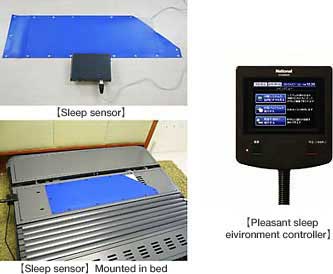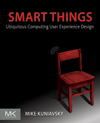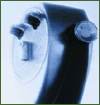It looks like National (aka Matsushita/Panasonic) is launching a smart bed. It's a combination of a bed with a pressure-sensitive pad (roughly serving a similar duty to the sensors in Stanford's Sleepsmart project [120K PDF]) and an ambient environment that's designed for optimal sleep:
The Kaimin System offers an integrated control of lighting fixtures, reclining bed, air mattress, air conditioning and audio-visual equipment through a ‘pleasant sleep environment controller’ which is built in with programs to adjust the room environment for a quality sleep.
I'm really pleased to see this coming to pass, and I'm glad they're actually testing it with people before launching it to the world at large, though I wonder how much testing went into the effectiveness of the environment. Their description of the testing says it was "used to improve the system and key devices in various manners to make them more practical" which implies usability testing of the interfaces, but doesn't get at whether it actually helps people sleep. The outline of their "Standard Course" sleep program has a pretty rigid definition of sleep, and implies that behavior that deviates from any of their "Standard Course" will need to be hand selected or programmed, which relies on people to know more about their own sleep patterns and to do more work than I think most people are going to be willing to do. Still, it's an interesting development in the world world of smart furniture and I wish 'em luck (and I'd like to know what their 60 applied-for patents are and how they differ from Stanford's work).




